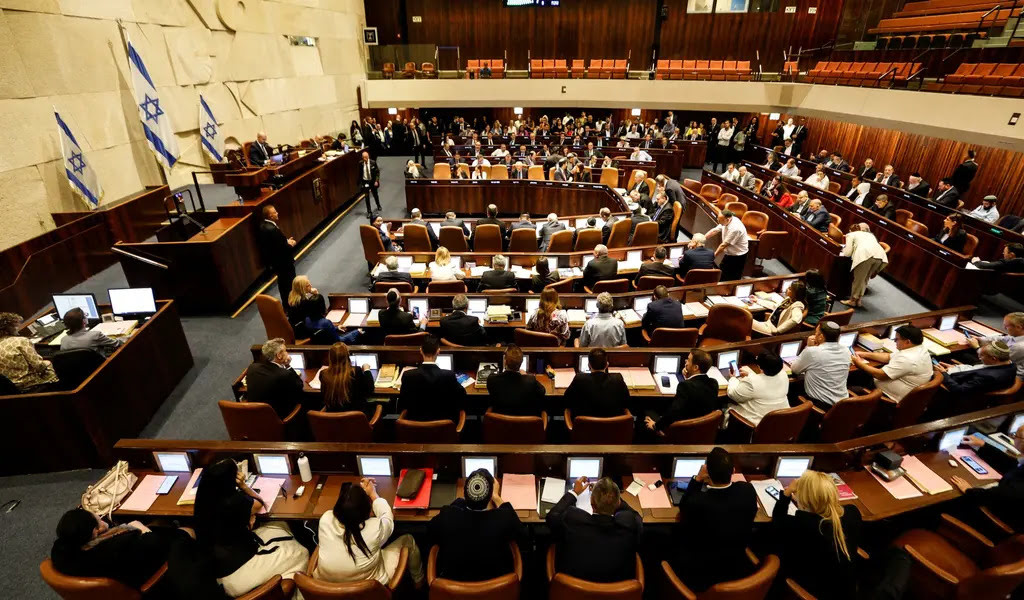News
Israel’s Parliament Passes Controversial ‘Reasonableness’ Bill: Curtailing Judiciary’s Power
(CTN NEWS) – On Monday, Israel’s parliament successfully approved the contentious “reasonableness” bill, marking a significant step in the government’s efforts to curtail the judiciary’s power.
This move has been met with strong opposition, with six months of protests and pressure from the United States, as it represents the most substantial transformation of the court system since the country’s establishment.
The bill secured a unanimous vote of 64-0, with all members of the ruling coalition supporting it. However, during the roll call vote, all opposition members decided to leave the chamber.
Despite rumors suggesting that Israeli Prime Minister Benjamin Netanyahu might reconsider the bill or make some concessions, the 73-year-old leader remained firm in his stance and proceeded with the vote.
Remarkably, he even arrived at the parliament, the Knesset, shortly after being discharged from the hospital.
Dubbed the “reasonableness” bill, it effectively removes the Supreme Court’s authority to deem government decisions as unreasonable.
This legislation constitutes the primary component of a comprehensive plan to reform the judiciary and has sparked a deep divide within the country, leading to hundreds of thousands of people taking to the streets in protest.
Here’s what you need to know about the situation.

Israel’s Controversial Judicial Overhaul: Balancing Powers or Threatening Democracy?
The judicial overhaul comprises a set of bills, and each of these bills must undergo three votes in the Knesset for approval.
Proponents of the overhaul, including Netanyahu and his supporters, argue that its purpose is to restore a proper balance of powers among the branches of government.
On the other hand, critics assert that it poses a significant threat to Israeli democracy and the independence of the judiciary.
The “reasonableness” doctrine, which is a central part of the proposed changes, is not exclusive to Israel’s judiciary. This principle is employed in several other countries, such as the United Kingdom, Canada, and Australia.
In those countries, this standard is frequently utilized by courts to assess the constitutionality or legality of a particular legislation. It empowers judges to ensure that decisions made by public officials are based on rational and justifiable grounds.
This year, the “reasonableness” standard came into play when Netanyahu removed Aryeh Deri, a key ally, from all ministerial positions.
This action followed an Israeli High Court ruling that deemed it unreasonable to appoint Deri to government positions due to his criminal convictions and his previous statement in court about retiring from public life.
Other aspects of the judicial overhaul aim to grant the right-wing government greater control over judge appointments and eliminate independent legal advisors from ministries.
However, these bills have not progressed as far in the legislative process as the “reasonableness” bill.
The prime minister and his supporters argue that the Supreme Court has become an insulated and elitist group that does not genuinely represent the interests of the Israeli people.
They believe the court has overstepped its boundaries by interfering in matters beyond its jurisdiction.
In defense of his plans, the prime minister has cited examples from countries like the United States, where politicians play a role in appointing and confirming federal judges.
Critics counter that Netanyahu is pushing the overhaul to safeguard himself from his ongoing corruption trial, where he faces charges of fraud, bribery, and breach of trust. The prime minister vehemently denies any wrongdoing.
Another bill, already approved in March, raises the bar for declaring a sitting prime minister unfit for office.
The bill restricts the reasons for such a declaration to physical or mental incapacity and mandates that either the prime minister themselves or two-thirds of the cabinet must vote in favor of the declaration.

Israel’s Judiciary Faces Historic Overhaul Amidst Strong Opposition and Economic Impact
If the overhaul is approved, it will mark the most significant and far-reaching transformation of Israel’s judiciary since its establishment in 1948.
Calls for changes to the judicial process have been present for some time, with individuals from various political backgrounds advocating for reforms in the past.
Israel, lacking a written constitution but relying on a series of quasi-constitutional basic laws, has a relatively robust Supreme Court, which supporters of the changes consider problematic.
However, the Supreme Court serves as the only mechanism to check the power of the Knesset and the government, given that the executive and legislative branches consistently remain under the control of the same governing coalition.
Critics argue that the proposed overhaul will effectively eliminate the sole avenue available to maintain checks and balances in the country’s governance.
They further caution that it will compromise the independence of the Israeli judiciary and have adverse effects on rights not explicitly protected in Israel’s basic laws, such as minority rights and freedom of expression.
Under Netanyahu’s leadership, Israel is governed by its most right-wing coalition in history, comprising both ultra-nationalist and ultra-religious parties. Certain members of the government have faced criticism for expressing extreme views.
According to polling conducted by the Israel Democracy Institute in February, the proposed changes have garnered support from only a minority of Israelis.
A vast majority, 72%, desire a compromise to be reached. Furthermore, 66% believe the Supreme Court should retain the power to strike down laws, and 63% of Israelis believe the current method of appointing judges should remain unchanged.
The bill has encountered strong opposition from millions of Israelis, including dozens of business leaders. Even Netanyahu’s own defense minister, Yoav Gallant, has repeatedly called for postponing the overhaul to pursue broader consensus.
Although Netanyahu threatened to dismiss Gallant earlier in the year for criticizing the overhaul, no action was taken.
To protest the bill’s passage, a group of 150 prominent Israeli companies went on strike on Monday.
Upon news of the new law, Israel’s main stock index, the TA-35, experienced a decline of over 2%. This index had been enjoying a recent rally, with a climb of more than 6% over the last month.
Additionally, the Israeli Shekel weakened against the dollar, dropping by just under 1%.

Israel’s Allies Express Concerns Over Proposed Judicial Overhaul
Israel’s allies, including the United States, have raised apprehensions regarding the proposed overhaul.
US President Joe Biden recently conveyed a message to Netanyahu through Thomas Friedman of the New York Times, warning that passing the overhaul without widespread consensus could jeopardize the US-Israeli relationship.
Biden emphasized the significance of the issue, acknowledging that Israelis hold strong opinions on the matter, as demonstrated by the enduring protest movement.
He stressed that the vibrancy of Israel’s democracy must remain at the heart of the bilateral relationship between the two nations.
Concerns have been raised by Israel’s allies, including the United States, in response to the proposed overhaul.
US President Joe Biden communicated a message to Netanyahu through Thomas Friedman of the New York Times, cautioning that if the overhaul is passed without broad consensus, it could potentially jeopardize the US-Israeli relationship.
Biden underscored the importance of the matter, recognizing the strength of opinions among Israelis, evident through the ongoing protest movement.
He emphasized that preserving the vibrancy of Israel’s democracy should be a central pillar of the bilateral relationship between the two countries.

Monday’s Bill Passage Intensifies Israel’s Internal Divide Amidst Warnings of Unrest and Constitutional Tensions
The passing of Monday’s bill could potentially deepen Israel’s domestic divide. Those opposing the bill have vowed not to sit idly, and the nation might witness labor strikes, military refusals, and even a constitutional crisis as a consequence.
The Histadrut, Israel’s umbrella labor union, issued a warning immediately after the bill’s approval, stating that continued unilateral legislation by the government would lead to severe consequences and prepared for a potential strike.
The Movement for Quality Government, an Israeli NGO, swiftly filed a petition with the Supreme Court, seeking to declare the “reasonableness” law unlawful.
They argued that it alters the fundamental structure of Israeli democracy and requested the court to halt its implementation until a ruling is made.
The Israel Bar Association is also gearing up for a legal challenge, as its executive, the Bar Council, has approved a petition to the Supreme Court aiming to overturn the “reasonableness” law once it passes.
The Bar Association further threatened to shut down as an act of protest against the perceived anti-democratic legislative process. This means that the Association would refrain from providing professional services to its members, though it wouldn’t result in lawyers going on strike.
Even Israel’s security establishment has been affected, with military members protesting the bill, and over 1,000 Air Force reservists threatening to halt their volunteering.
Former Prime Minister Yair Lapid urged the reservists, whose spirits were disheartened by the bill’s passage, not to refuse to serve until the Supreme Court reaches a verdict on the law.
Petitions to the Supreme Court to invalidate the law and block its implementation until a ruling are expected to be filed on Tuesday when the court opens.
If the Supreme Court declares the “unreasonableness” law itself unreasonable and void, annulling the law that diminishes the court’s powers, this could trigger a constitutional crisis, potentially pitting the government against the court.
RELATED CTN NEWS:
President Biden To Establish Emmett Till National Monument: Honoring A Tragic Legacy
Chinese President Xi Jinping To Host World Leaders At World University Games Opening In Chengdu
News
Trudeau’s Gun Grab Could Cost Taxpayers a Whopping $7 Billion

A recent report indicates that since Trudeau’s announcement of his gun buyback program four years ago, almost none of the banned firearms have been surrendered.
The federal government plans to purchase 2,063 firearm models from retailers following the enactment of Bill C-21, which amends various Acts and introduces certain consequential changes related to firearms. It was granted royal assent on December 15 of last year.
This ban immediately criminalized the actions of federally-licensed firearms owners regarding the purchase, sale, transportation, importation, exportation, or use of hundreds of thousands of rifles and shotguns that were previously legal.
The gun ban focused on what it termed ‘assault-style weapons,’ which are, in reality, traditional semi-automatic rifles and shotguns that have enjoyed popularity among hunters and sport shooters for over a century.
In May 2020, the federal government enacted an Order-in-Council that prohibited 1,500 types of “assault-style” firearms and outlined specific components of the newly banned firearms. Property owners must adhere to the law by October 2023.
Trudeau’s Buyback Hasn’t Happened
“In the announcement regarding the ban, the prime minister stated that the government would seize the prohibited firearms, assuring that their lawful owners would be ‘grandfathered’ or compensated fairly.” “That hasn’t happened,” criminologist Gary Mauser told Rebel News.
Mauser projected expenses ranging from $2.6 billion to $6.7 billion. The figure reflects the compensation costs amounting to $756 million, as outlined by the Parliamentary Budget Office (PBO).
“The projected expenses for gathering the illegal firearms are estimated to range from $1.6 billion to $7 billion.” “This range estimate increases to between $2.647 billion and $7 billion when compensation costs to owners are factored in,” Mauser stated.
Figures requested by Conservative MP Shannon Stubbs concerning firearms prohibited due to the May 1, 2020 Order In Council reveal that $72 million has been allocated to the firearm “buyback” program, yet not a single firearm has been confiscated to date.
In a recent revelation, Public Safety Canada disclosed that the federal government allocated a staggering $41,094,556, as prompted by an order paper question from Conservative Senator Don Plett last September, yet yielded no tangible outcomes.
An internal memo from late 2019 revealed that the Liberals projected their politically motivated harassment would incur a cost of $1.8 billion.
Enforcement efforts Questioned
By December 2023, estimates from TheGunBlog.ca indicate that the Liberals and RCMP had incurred or were responsible for approximately $30 million in personnel expenses related to the enforcement efforts. The union representing the police service previously stated that the effort to confiscate firearms is a “misdirected effort” aimed at ensuring public safety.
“This action diverts crucial personnel, resources, and funding from tackling the more pressing and escalating issue of criminal use of illegal firearms,” stated the National Police Federation (NPF).
The Canadian Sporting Arms & Ammunition Association (CSAAA), representing firearms retailers, has stated it will have “zero involvement” in the confiscation of these firearms. Even Canada Post held back from providing assistance due to safety concerns.
The consultant previously assessed that retailers are sitting on almost $1 billion worth of inventory that cannot be sold or returned to suppliers because of the Order-In-Council.
“Despite the ongoing confusion surrounding the ban, after four years, we ought to be able to address one crucial question.” Has the prohibition enhanced safety for Canadians? Mauser asks.
Illegally Obtained Firearms are the Problem
Statistics Canada reports a 10% increase in firearm-related violent crime between 2020 and 2022, rising from 12,614 incidents to 13,937 incidents. In that timeframe, the incidence of firearm-related violent crime increased from 33.7 incidents per 100,000 population in 2021 to 36.7 incidents the subsequent year.
“This marks the highest rate documented since the collection of comparable data began in 2009,” the criminologist explains.
Supplementary DataData indicates that firearm homicides have risen since 2020. “The issue lies not with lawfully-held firearms,” Mauser stated.
Firearms that have been banned under the Order-in-Council continue to be securely stored in the safes of their lawful owners. The individuals underwent a thorough vetting process by the RCMP and are subject to nightly monitoring to ensure there are no infractions that could pose a risk to public safety.
“The firearms involved in homicides were seldom legally owned weapons wielded by their rightful owners,” Mauser continues. The number of offenses linked to organized crime has surged from 4,810 in 2016 to a staggering 13,056 in 2020.
“If those in power … aim to diminish crime and enhance public safety, they ought to implement strategies that effectively focus on offenders and utilize our limited tax resources judiciously to reach these objectives,” he stated.
Related News:
Millennials in Canada Have Turned their Backs on Justin Trudeau
Millennials in Canada Have Turned their Backs on Justin Trudeau
News
Google’s Search Dominance Is Unwinding, But Still Accounting 48% Search Revenue

Google is so closely associated with its key product that its name is a verb that signifies “search.” However, Google’s dominance in that sector is dwindling.
According to eMarketer, Google will lose control of the US search industry for the first time in decades next year.
Google will remain the dominant search player, accounting for 48% of American search advertising revenue. And, remarkably, Google is still increasing its sales in the field, despite being the dominating player in search since the early days of the George W. Bush administration. However, Amazon is growing at a quicker rate.
Google’s Search Dominance Is Unwinding
Amazon will hold over a quarter of US search ad dollars next year, rising to 27% by 2026, while Google will fall even more, according to eMarketer.
The Wall Street Journal was first to report on the forecast.
Lest you think you’ll have to switch to Bing or Yahoo, this isn’t the end of Google or anything really near.
Google is the fourth-most valued public firm in the world. Its market worth is $2.1 trillion, trailing just Apple, Microsoft, and the AI chip darling Nvidia. It also maintains its dominance in other industries, such as display advertisements, where it dominates alongside Facebook’s parent firm Meta, and video ads on YouTube.
To put those “other” firms in context, each is worth more than Delta Air Lines’ total market value. So, yeah, Google is not going anywhere.
Nonetheless, Google faces numerous dangers to its operations, particularly from antitrust regulators.
On Monday, a federal judge in San Francisco ruled that Google must open up its Google Play Store to competitors, dealing a significant blow to the firm in its long-running battle with Fortnite creator Epic Games. Google announced that it would appeal the verdict.
In August, a federal judge ruled that Google has an illegal monopoly on search. That verdict could lead to the dissolution of the company’s search operation. Another antitrust lawsuit filed last month accuses Google of abusing its dominance in the online advertising business.
Meanwhile, European regulators have compelled Google to follow tough new standards, which have resulted in multiple $1 billion-plus fines.

Pixa Bay
Google’s Search Dominance Is Unwinding
On top of that, the marketplace is becoming more difficult on its own.
TikTok, the fastest-growing social network, is expanding into the search market. And Amazon has accomplished something few other digital titans have done to date: it has established a habit.
When you want to buy anything, you usually go to Amazon, not Google. Amazon then buys adverts to push companies’ products to the top of your search results, increasing sales and earning Amazon a greater portion of the revenue. According to eMarketer, it is expected to generate $27.8 billion in search revenue in the United States next year, trailing only Google’s $62.9 billion total.
And then there’s AI, the technology that (supposedly) will change everything.
Why search in stilted language for “kendall jenner why bad bunny breakup” or “police moving violation driver rights no stop sign” when you can just ask OpenAI’s ChatGPT, “What’s going on with Kendall Jenner and Bad Bunny?” in “I need help fighting a moving violation involving a stop sign that wasn’t visible.” Google is working on exactly this technology with its Gemini product, but its success is far from guaranteed, especially with Apple collaborating with OpenAI and other businesses rapidly joining the market.
A Google spokeswoman referred to a blog post from last week in which the company unveiled ads in its AI overviews (the AI-generated text that appears at the top of search results). It’s Google’s way of expressing its ability to profit on a changing marketplace while retaining its business, even as its consumers steadily transition to ask-and-answer AI and away from search.

Google has long used a single catchphrase to defend itself against opponents who claim it is a monopoly abusing its power: competition is only a click away. Until recently, that seemed comically obtuse. Really? We are going to switch to Bing? Or Duck Duck Go? Give me a break.
But today, it feels more like reality.
Google is in no danger of disappearing. However, every highly dominating company faces some type of reckoning over time. GE, a Dow mainstay for more than a century, was broken up last year and is now a shell of its previous dominance. Sears declared bankruptcy in 2022 and is virtually out of business. US Steel, long the foundation of American manufacturing, is attempting to sell itself to a Japanese corporation.
SOURCE | CNN
News
The Supreme Court Turns Down Biden’s Government Appeal in a Texas Emergency Abortion Matter.

(VOR News) – A ruling that prohibits emergency abortions that contravene the Supreme Court law in the state of Texas, which has one of the most stringent abortion restrictions in the country, has been upheld by the Supreme Court of the United States. The United States Supreme Court upheld this decision.
The justices did not provide any specifics regarding the underlying reasons for their decision to uphold an order from a lower court that declared hospitals cannot be legally obligated to administer abortions if doing so would violate the law in the state of Texas.
Institutions are not required to perform abortions, as stipulated in the decree. The common populace did not investigate any opposing viewpoints. The decision was made just weeks before a presidential election that brought abortion to the forefront of the political agenda.
This decision follows the 2022 Supreme Court ruling that ended abortion nationwide.
In response to a request from the administration of Vice President Joe Biden to overturn the lower court’s decision, the justices expressed their disapproval.
The government contends that hospitals are obligated to perform abortions in compliance with federal legislation when the health or life of an expectant patient is in an exceedingly precarious condition.
This is the case in regions where the procedure is prohibited. The difficulty hospitals in Texas and other states are experiencing in determining whether or not routine care could be in violation of stringent state laws that prohibit abortion has resulted in an increase in the number of complaints concerning pregnant women who are experiencing medical distress being turned away from emergency rooms.
The administration cited the Supreme Court’s ruling in a case that bore a striking resemblance to the one that was presented to it in Idaho at the beginning of the year. The justices took a limited decision in that case to allow the continuation of emergency abortions without interruption while a lawsuit was still being heard.
In contrast, Texas has been a vocal proponent of the injunction’s continued enforcement. Texas has argued that its circumstances are distinct from those of Idaho, as the state does have an exemption for situations that pose a significant hazard to the health of an expectant patient.
According to the state, the discrepancy is the result of this exemption. The state of Idaho had a provision that safeguarded a woman’s life when the issue was first broached; however, it did not include protection for her health.
Certified medical practitioners are not obligated to wait until a woman’s life is in imminent peril before they are legally permitted to perform an abortion, as determined by the state supreme court.
The state of Texas highlighted this to the Supreme Court.
Nevertheless, medical professionals have criticized the Texas statute as being perilously ambiguous, and a medical board has declined to provide a list of all the disorders that are eligible for an exception. Furthermore, the statute has been criticized for its hazardous ambiguity.
For an extended period, termination of pregnancies has been a standard procedure in medical treatment for individuals who have been experiencing significant issues. It is implemented in this manner to prevent catastrophic outcomes, such as sepsis, organ failure, and other severe scenarios.
Nevertheless, medical professionals and hospitals in Texas and other states with strict abortion laws have noted that it is uncertain whether or not these terminations could be in violation of abortion prohibitions that include the possibility of a prison sentence. This is the case in regions where abortion prohibitions are exceedingly restrictive.
Following the Supreme Court’s decision to overturn Roe v. Wade, which resulted in restrictions on the rights of women to have abortions in several Republican-ruled states, the Texas case was revisited in 2022.
As per the orders that were disclosed by the administration of Vice President Joe Biden, hospitals are still required to provide abortions in cases that are classified as dire emergency.
As stipulated in a piece of health care legislation, the majority of hospitals are obligated to provide medical assistance to patients who are experiencing medical distress. This is in accordance with the law.
The state of Texas maintained that hospitals should not be obligated to provide abortions throughout the litigation, as doing so would violate the state’s constitutional prohibition on abortions. In its January judgment, the 5th United States Circuit Court of Appeals concurred with the state and acknowledged that the administration had exceeded its authority.
SOURCE: AP
SEE ALSO:
Could Last-Minute Surprises Derail Kamala Harris’ Campaign? “Nostradamus” Explains the US Poll.
-

 News3 years ago
News3 years agoLet’s Know About Ultra High Net Worth Individual
-
Entertainment2 years ago
Mabelle Prior: The Voice of Hope, Resilience, and Diversity Inspiring Generations
-

 Health3 years ago
Health3 years agoHow Much Ivermectin Should You Take?
-

 Tech2 years ago
Tech2 years agoTop Forex Brokers of 2023: Reviews and Analysis for Successful Trading
-

 Lifestyles2 years ago
Lifestyles2 years agoAries Soulmate Signs
-

 Movies2 years ago
Movies2 years agoWhat Should I Do If Disney Plus Keeps Logging Me Out of TV?
-

 Health3 years ago
Health3 years agoCan I Buy Ivermectin Without A Prescription in the USA?
-

 Learning2 years ago
Learning2 years agoVirtual Numbers: What Are They For?

